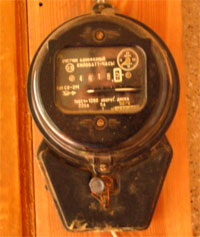 Akhalkalaki dwellers cannot understand why they should pay for more electricity than they have used. Some of them face problems because of old meters; others pay padded bills because of some faults on computer program which estimates fees on electricity.
Akhalkalaki dwellers cannot understand why they should pay for more electricity than they have used. Some of them face problems because of old meters; others pay padded bills because of some faults on computer program which estimates fees on electricity.
Company “Power-Pro Georgia” provides the Akhalkalaki district with electricity supply. Local service centers host a lot of people everyday who are inquiring about their electricity bills. Most of them are sure that they pay much more than they should.
Many of applicants leave office without finding out the exact reason for technical and arithmetical faults for what they have to pay more.
Marina Altunian is one of those subscribers who applied to the service center for explanation. She lives in the area of former Military Base # 1 in Akhalkalaki with her mother and daughter. A year ago her husband left the town for getting employed in some other place and the number of family members has reduced. Marina expected that electricity bill should be shortened after the departure of her husband though in fact it almost doubled.
“I used to pay 18-21 lari in the past; now I have to pay doubled price. They do not write out previous and current figures from electricity meters. They give only utility bill and the total amount of used electricity,” said Marina.
She, like many other inhabitants of the district, has soviet meters. The representatives of the Power Company claim that the old meters cannot record the exact figure of the consumed electricity. Thus they have installed new communal meters which show the wasted electricity for several families.
At the end of the month cash messenger copies out the figures from family meters, counts them and compares to communal meters. If there is any difference between communal and family meters, the cash messenger divides the total sum among subscribers and then draws up final bill for a subscriber.
However, inhabitants of the territory on the former military base doubt that the figures from the communal meters are not recorded correctly. They think that they should also check the communal meters together with cash messengers.
During last two years new meters were installed in almost every family in Akhalkalaki. Old meters remained only in villages, in small part of the town and in the area of the former military base.
Janiko Astaturian, manager of the Akhalkalaki Service Center of the JSC “Power-Pro Georgia”, said that the problem on padded fees will exist until new meters are installed in every family.
“We are not the only service center which works in similar method throughout Georgia; wherever new meters were not installed subscribers face similar problems,’ said Janiko Astaturian.
New communal meters were installed in Samtskhe-Javakheti Region nearly two years ago. Last winter one group of discontent Akhalkalaki dwellers broke into the local service center. Forced the employees out and broke the door of the center in protest. Criminal case was launched against one of the leaders of the rally. Several months later new individual meters were installed in the town. It is noteworthy that in many cities of Georgia, like Kutaisi the installation process has not started yet.
Armine Harutunian, who lives in the area of the former military base, said that she was asked to pay one hundred lari to install the meter.
“I requested to change my electricity meter because I think it causes my problems. I was told at the service center that I should pay for a new meter; but I cannot afford it,” said Armine.
“Eight hundred meters should be installed in the area of the former military base and it will cost much. However, there is a project on installing digital meters has already been prepared. So it is our duty to install meters,” said Astaturian.
Subscribers with digital meters also apply to the service center with some complaints. They are cusious how bills are counted.
In many regions of Georgia differentiated taxes on electricity work-they are low, average and high taxes and it depends on the amount of the used electricity during a month.
Vahang Shirinian and his wife have digital meter at home. They do not work. They pay the bill from their pension so they try to use electricity economically. However, it is not a great relief for them and they usually have to pay much.
“We try to spend less than 100 kilowatts a month in order to pay the bills according to lower taxes. Last month we had spent 96 kilowatts but the bill was counted according to an average tax. Consequently, we paid 3, 4 lari more than we should have,” said Shirinian.
Guram Tsitskaladze, responsible person at the “Power-Pro Georgia’s Service Center, defined that the problems is caused by a computer program which estimates the tax.
Tsitskaladze said that the tax is counted according to the used electricity during a month. If the first days of the month are week-end or holiday and cash messengers have a day-off, the figures of the meters cannot be stored in computer. The data are recorded only after days-off.
“Consequently, the figures of 28-day are recorded instead of 30-day, as it happened in September,” said Tsitskaladze.
To add the figures on remaining days to the estimated 28 days the computer automatically counts the average figure of the daily consumed electricity by a person. Then it is multiplied on the remained two days and final bill is utilized.
Gulo Kokhodze, Akhalkalaki



